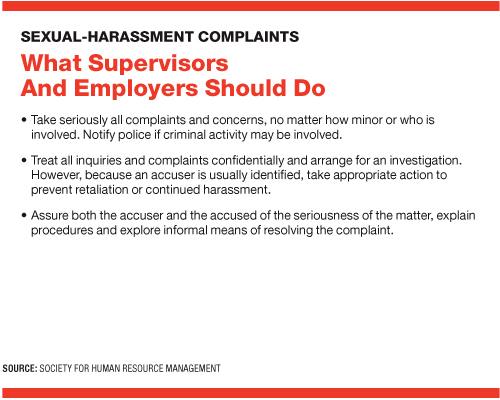

You could call it "jerk control"—what companies do to prevent or prepare for the day an employee crosses the line and starts making racial, sexual or intimidating comments to a co-worker or subordinate. Solid anti-discrimination and abuse policies and complaint procedures have helped contractors prevail in many of the lawsuits filed against them.
Whether that has helped cleanse construction of abusive maltreatment is another matter, especially if you believe true change only comes with an overhaul of company values that goes beyond printed policies.
One case from several years ago illustrates how companies handle sexual-harassment complaints. Nancy Pastula, a heavy-equipment operator in Maine for Lane Construction Corp., sued Lane in federal district court in Portland over abuse she claimed she took from a supervisor. He allegedly peppered his conversation with sexual references, including encouraging Pastula many times to "flash" the rest of the crew. Pastula complained to the company, but after some attempts to separate her from the offending supervisor, she sued Lane under Title VII of the Civil Rights Act, the section that outlaws sexual harassment.
Lane admitted to some of what Pastula said had happened but claimed it had handled the matter properly. The company asked a federal judge for summary judgment, a comparatively quick decision that would avoid a full and more costly trial.
In 2006, the federal judge, Margaret Kravchuk, ruled in favor of Lane, noting her own obligation to distinguish between "severely or pervasively hostile treatment" and "basic civility issues" involving only isolated incidents and teasing. She wrote that Lane had a solid policy against sexual harassment, even though Pastula claimed at the trial that it wasn't enforced.
Despite the Pastula case, Lane has not changed what it considers to be already strong harassment policies and staff training, says Jay S. Cruickshank, the company's executive vice president and general counsel. In 2009, Lane started an ethics hotline to make it easier for employees to make complaints and raise concerns before matters "get carried away and people feel it is necessary to file a lawsuit."
Companies differ in the way they enforce anti-harassment policies. Some follow the model policy for sexual-harassment claims and investigations written by the Society for Human Resource Management. It includes a provision to protect the complainant from retaliation during and after the period of investigation.
Limiting Conflicts to Keep the Peace
Companies also try to squelch conflicts before they explode into violence. Buffalo, N.Y.–based L.P. Ciminelli, a contractor and construction manager, has its employees take and sign an online training module each year. "We don't specifically label it 'bullying,' " says Kirsti A. Hunt, Ciminelli's human-resources vice president, referring to the anti-violence training. However, it amounts to the same thing. "Conduct that threatens or intimidates or coerces another person won't be tolerated," she says.
Nevertheless, construction jobsites pose some unique problems. People are on the road or working together for long periods of time under stress and in difficult conditions.
Portland, Ore.-based Walsh Construction Co. takes a strong stand. The training for employees includes discussion of specific situations, including some based on Walsh's research of lawsuits against other companies.
More important, Walsh encourages field staff, especially superintendents, to contact Walsh's human-resources department about problems.
"As managers, there's just more emphasis on their responsibility of stopping the behavior immediately, getting it reported to HR and participating in the investigation," says Patti Murphy, Walsh's human-resources director. In return, she says, the human-resources staff provides support.
Lane's current ethics policy prohibits harassment, coercion, retaliation or intimidation and workplace bullying. In the last couple of years, Cruickshank notes, Lane has "had to part ways with several employees who engaged in workplace bullying."


Post a comment to this article
Report Abusive Comment